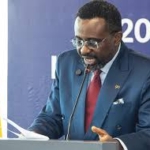
It has been said in many forums that Africa’s problems are caused by poor leadership and a bad governance style. This means that the leadership style of most African leaders has largely, have not helped to rid the continent of underdevelopment. This kind of leadership has rather inhibited growth and development and left Africa deprived and dependent on others.
In a speech during his visit to the Parliament of Ghana in 2009, then President Barack Obama of the US suggested that Africa did not need strong men, but strong institutions. This indicates how African leaders have exhibited authoritativeness, which has not helped the continent to evolve a good governance system with its attendant impact on development.
Perhaps the solution lies elsewhere; the solution to Africa’s problems lies with a very simple type of leadership. This style of leadership produces results even though it is not popular with the African ruling class. This type of leadership is what is described by the former Vice Chancellor (VC) of the Catholic University of Ghana (CUG), Sir Professor Daniels Obeng Ofori, as selfless leadership that is geared towards problem-solving. The professor made this revelation on Saturday in his farewell message as the immediate past VC of the CUG during the investiture of a new VC.
In his message, the professor asked the new Vice Chancellor to “show mutual respect to all staff, from labourer to cleaner to the professor and student alike.” He also asked the VC to take “the contribution of all staff and inspire them to put in their best. By so doing, you will receive manifold respect from all staff and students.”
Listening to him, I realised the extent to which most leaders have turned the tables when it comes to respect. The leadership we are used to in Africa is one in which the leader demands respect from followers instead of setting the pace for reciprocity of respect. As such, most leaders would not regard people below them, not to mention respecting labourers and cleaners, as the professor indicates.
In that case, since respect ought to be mutual, subordinates may also not respect the leader, and when respect is absent, it is automatically replaced by fear for the leader. In this state of fear, not friendliness, the leader then would have taken God out of the picture. He or she becomes the “strong man” in the realm who would be cracking the whip instead of helping members to fit into the socio-political structure. To this, Prof Obeng Ofori observes that, “If you are following God, then leading people becomes about helping them to discover what God is calling them to do, not just getting them to do what you want to do. Be celebrative instead of authoritative.”
Then comes the issue of failure to understand the essence of leadership. A leader is supposed to create wealth and prosperity, which would affect lives and advance the purpose of God for humanity. This can be done only when leaders are innovative to bring out interventions that produce development. But how can one attract such innovations? As Professor Obeng Ofori suggests, such innovations would come from the right source, which is inspiration from God, not from the ambition of the leader.
In that regard, the professor indicates that, “True innovation is not about impressing people with how clever you are; it’s about discovering the solutions that God wants to bring into the world through you. There is a difference between innovation that comes through human ambition and innovation that comes from divine inspiration. Both can produce impressive results, but only one can produce lasting transformation. When you are innovative from ambition, you are limited by your own possibilities; when you innovate by divine inspiration, you are connected to the infinite wisdom and unlimited possibilities.”
By this assertion, the challenges we are facing as Africans are because we allow leadership to become a contest between people, with each contender showing how ambitious he or she can be. This would therefore lead to ambition, which cannot promote the well-being of anybody other than the agenda of the “ambitious man.” If you take a look at the Ghanaian national politics, for instance, election after election, all politicians do is to hurriedly put together manifestoes which are nothing but deceptive documents. In the end, because those documents present the ambitions of people, they do nothing for anybody, and our plight continues.
If we are to listen to the professor, we would go for the inspiration from God, which would bring us true innovations and help us solve our problems. This means that most African leaders have put aside the infinite wisdom of God, which has robbed the continent of the unlimited possibilities for development.
This is not an attempt to bring religion into governance and leadership; it is just to suggest that one cannot by him or herself do anything extraordinary because we are human and are limited. This means that God has a role to play in how successful we become, not just by being religious, but by allowing Him to assist us in what we do. “Please remember that God designed you, so he is not waiting for you to prove your worth through your work; rather, God is waiting for you to trust him with your work. Rather, when you are trying to prove your worth, everything centres around you; when you are trusting God with your work, every project becomes something bigger than yourself,” Professor Obeng Ofori explained.
Finally, true leadership is also about humility to accept failure. Most of the time, when people fail in a particular endeavour, pride prevents them from accepting the reality of the failure. Rather, they arrogantly suggest that they are still winning even though everything suggests otherwise. But, according to the professor, failure only helps to reveal our state. He says, “It is exciting to see failure as a sign that you need God; failure is not the enemy of our purpose, sometimes it is the pathway to our purpose.”
Our challenges as Africans are because we have failed to understand the role of leadership in development. Africa can be free only if it rids itself of bad leadership and promotes persons with the right leadership qualities. It is time to say no to strong and authoritative leadership, and promote simple, humble and genuine leaders with the capacity to turn our fortunes around.
*******
You can reach out to the writer via email at [email protected]
- President Commissions 36.5 Million Dollars Hospital In The Tain District
- You Will Not Go Free For Killing An Hard Working MP – Akufo-Addo To MP’s Killer
- I Will Lead You To Victory – Ato Forson Assures NDC Supporters
Visit Our Social Media for More




